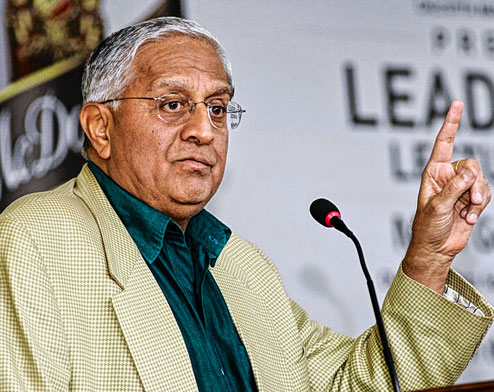 |
| Tata Sons director R. Gopalakrishnan delivers a lecture on sanskara on Tuesday. (Sanat Kr. Sinha) |
The Williamson Magor Hall at the Bengal Chamber of Commerce was chock-a-block with corporate honchos and management trainees on Tuesday evening.
The veterans and the novices had assembled to listen to management guru R. Gopalakrishnan’s vision on “sanskara” and witness the launch of his fourth book, A Comma in a Sentence, as part of the Leadership Lecture series presented by Calcutta Management Association, in association with The Telegraph.
For the director of Tata Sons, sanskara is a subject he felt deeply about and spent two hours underlining its need in the evolution and longevity of an institution. “My book A Comma in a Sentence also has sanskara in it,” he said, but pondered: “Why should professional managers be at all interested in sanskara?”
The New York Herald Tribune had published a piece titled “Why communities succeed in America”.
The article, Gopalakrishnan said, listed three factors for the success of Indian Americans, Chinese Americans and Jewish Americans. First, they are confident of their superiority or their ability. Second, they have an inferiority complex about what they are doing — they believe they can do better. And finally, they have impulse control (an American expression which means the ability to postpone gratification, be austere and disciplined).
“These factors have caused Jewish Americans, who comprise 2 per cent of the population, to account for 50 per cent of America’s wealth. The writers also mention Indian Americans as having these characters. And if we demystify these Americanisms, the three factors... are very much present in the Indian community. These are sanskaras among Indians,” said Gopalakrishnan.
In English, sanskara can roughly be translated as culture, tradition, habits. “But none of these quite describes sanskara. Sanskara is a totality,” feels the management expert, who then narrated a story from his Unilever training programme in London 35 years ago.
“There was another Unilever worker from the US with us. For him the world ended with Upper Manhattan and Denver. He wanted to know about India and I took him out for an Indian meal. I was eating with my hands and he was greatly shocked at that. So I asked him: ‘How do you eat with a knife and fork? How many mouths do you think your knife and fork have entered? They might have entered the mouth of a horse. And you think that’s hygienic?’”
While the former Unilever executive got the better of his American counterpart with the repartee, he said: “This act of eating with your hand is something that is sanskara. I cannot think of eating dosa with a knife and fork.”
All over the world Unilever had a product — dish washing liquid. It sold everywhere but India. A lot of attempt was made to sell it here by increasing the detergent content, so one can have a lot of lather but it never worked. “Finally, I found that Indians will never wash their dishes en masse in a detergent liquid. They have to scrub each dish individually. Otherwise, it will be jhuta. This is our sanskara,” explained Gopalakrishnan.
Talking about his book, the author said: “The book is my family history but it is really about people and real incidents. I researched this when I talked to my elders in the family.”
The book starts with Tipu Sultan and ends today. “I’m hoping my grandson will pick up the thread some day,” said Gopalakrishnan.
Rudranghsu Mukherjee of The Telegraph was intrigued by the title as “the comma in our trade is a very important punctuation mark”.
Gopalakrishnan’s reply: “I had a particular epiphany when I visited my village and that set me on my path of the book. It is a 200-year-history of my family and the times. Friends went wow about the time span, but it was really a small period in history, it was a comma.”











